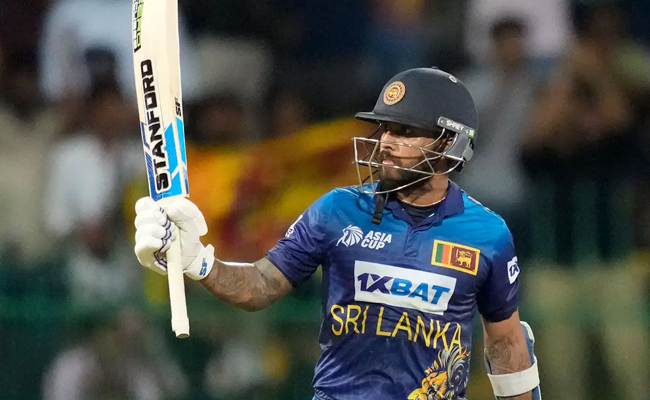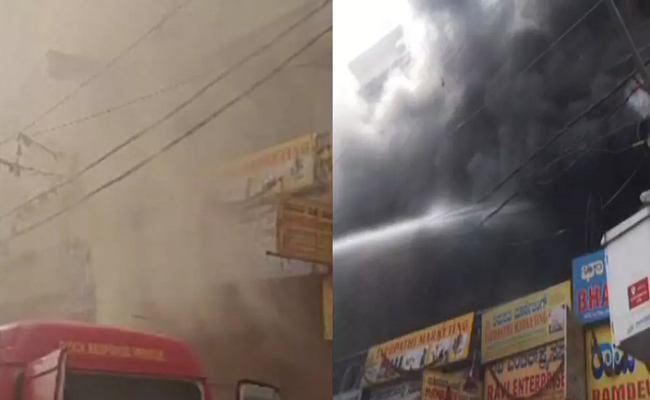Colombo (PTI): Kusal Mendis produced an outstanding 91 and Charith Asalanka a gutsy unbeaten 49 as defending champions Sri Lanka overcame Pakistan by two wickets in a dramatic Super Four match here on Thursday to set up an Asia Cup final against India.
Fifties by Abdullah Shafique (52) and Mohammad Rizwan (86 not out) had led Pakistan to a competitive 252 for 7 off 42 overs after electing to bat on another rain-affected day.
But Sri Lanka replied in kind through Mendis and Asalanka as they inched past the target off the last ball of the match, also spoiling the possibility of an Indo-Pak summit clash.
The final will be played on Sunday.
The manner in which Sri Lanka mounted their chase was quite remarkable, even considering the fact that Pakistan were without injured pacers Naseem Shah and Haris Rauf.
After Kusal Perera departed early, Mendis in the company of Pathum Nissanka (29) steadied the Lankan innings with a 57-run stand for the second wicket.
But an even better passage was in the waiting for the Lankans, despite Nissanka spooning a return catch to Shadab Khan.
Mendis and Sadeera Samarawickrama (48 off 51 balls) added 100 runs for the third wicket, as Lanka gradually bridged the gap.
Mendis is blessed with natural striking prowess and timing, and his knock was a validation of that. The right-hander used his feet well against spinners, and faced the quicker lot with assurance.
Samarawickrama, even though he was pinged on the helmet once by Shaheen Afridi, kept his end going with some sensible cricket.
But a momentary rush ended his stay. Iftikhar caught him in no-man's land with a slightly fuller length ball, and Rizwan made an easy stumping.
Mendis milked a further 33 runs along with Asalanka, but Iftikhar returned to dismiss him.
Mendis' effort to turn the ball off his pads resulted in a leading edge, which was caught superbly by a diving Mohamamd Harris.
Thereafter Sri Lanka fell into panic mode, losing four wickets in as many overs and it seemed that they were on the verge of botching up the chase.
Afridi did the damage during that phase with two wickets in successive balls. But Asalanka held his nerves in the final over to carry his side home.
Earlier, Shafique and Rizwan propped up Pakistan innings with fine fifties. Pakistan also received some late push from Iftikhar Ahmed (47 off 40 balls).
The pitch was not the smoothest to bat on, but Pakistan found some early momentum through Shafique and captain Babar Azam after the dismissal of Fakhar Zaman.
Shafique and Babar milked 64 runs in a little over 11 overs. Shafique scored runs in a more orthodox way and his cracking cover drive off pacer Matheesha Pathirana was a sight for sore eyes.
Just as the second wicket alliance was blossoming, Dunith Wellalage snapped it. The left-arm spinner, who grabbed five top-order batsmen against India on Tuesday, this time weaved his magic around Babar.
Babar assumed the ball was coming into him once it pitched outside the off-stump and he played for the spin, but it went away from him for Mendis to complete a flash stumping.
The dismissal of Babar pushed Pakistan into a mini-collapse as they lost three more wickets for 30 runs inside six overs.
At 130 for five, they were in danger of getting out for a below par total, as the Lankan spinners tried to dominate the proceedings in the middle overs as they had done against India.
But Rizwan and Iftikhar dashed their hopes during an entertaining 108-run stand for the sixth wicket.
In fact, the last 10 overs between 32 and 42 saw Pakistan adding 102 runs as Rizwan and Iftikhar waded into Lankan bowlers.
Veteran wicketkeeper batsman Rizwan was not among runs of late, and he chose a perfect moment to get a few against his name.
It was a typical innings by Rizwan, starting on a slower tempo before exploding in the latter part with some towering shots through the on-side.
Iftikhar has a non-complicated mind as a batsman, as he just tries to muscle every ball coming his way out of the ground and the right-hander employed a similar strategy here as well.
Iftikhar and Rizwan managed to take Pakistan to a healthy total but they could not defy the determination of the Lankans.
Let the Truth be known. If you read VB and like VB, please be a VB Supporter and Help us deliver the Truth to one and all.
Mumbai (PTI): The rupee rose 6 paise to 90.85 against the US dollar in early trade on Thursday on the back of a weaker greenback and FII inflows.
A positive start to the session at the domestic equity markets lent further support to the local unit while a rise in global crude oil prices, coupled with geopolitical uncertainties, capped sharp gains, according to forex traders.
At the interbank foreign exchange, the rupee opened at 90.86 against the greenback before inching up to 90.85, higher by 6 paise from its previous close.
The rupee stayed range-bound and settled with a gain of 4 paise at 90.91 against the US dollar on Wednesday.
"As the dollar index fell and Asian currencies gained today (Thursday) the rupee opened higher... A risk-on sentiment in the markets and RBI selling near 91.00 levels ensured yesterday (Wednesday) also that rupee is unable to cross 91.00 levels with FPIs being buyers of equity and sellers of dollars," Anil Kumar Bhansali, Head of Treasury and Executive Director, Finrex Treasury Advisors LLP, said.
Meanwhile, the dollar index, which gauges the greenback's strength against a basket of six currencies, was trading 0.13 per cent down at 97.57.
Brent crude, the global oil benchmark, rose 0.21 per cent to USD 71.00 per barrel in futures trade.
On the domestic equity market front, the Sensex climbed 303 points to 82,579.16 in early trade, while the Nifty rose 85.1 points to 25,567.60.
On Wednesday, foreign institutional investors purchased equities worth Rs 2,991.64 crore, according to exchange data.





